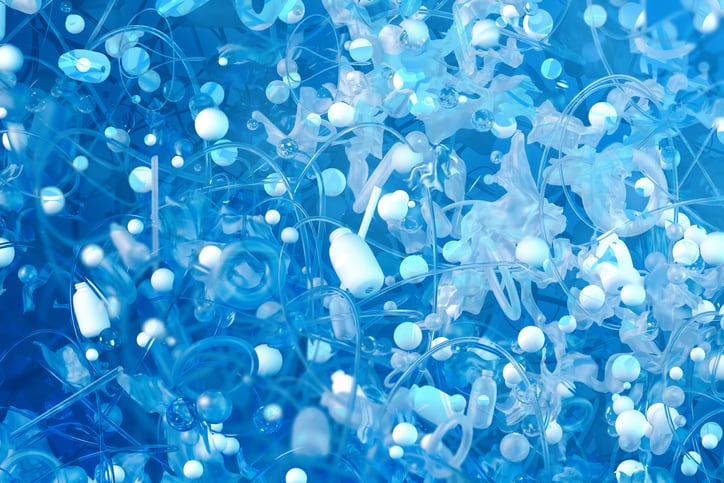The review by authors from Iran, suggests that due to the proven negative effects of micro and nano-plastics on gut function, and the beneficial effects of probiotics, “the use of probiotics might reduce the toxicity of these materials in humans.”
Micro and Nano plastics
The use of plastics is rapidly increasing worldwide, with estimates predicting a significant rise in plastic manufacturing from 368 million tons in 2019, to 33 billion tons by 2050.
Plastics, including polystyrene (PS), are widely used in various industries due to their unique properties and are an environmental concern due to their stable crystal structure and high molecular weight.
The accumulation of plastic particles, known as microplastics (MPs) and nanoplastics (NPs), has become a major environmental concern.
MPs are defined as plastic particles smaller than 5 mm, while those smaller than 0.1 μm are NPs.
These particles can contaminate food products through various pathways and are easily absorbed by the gastrointestinal tract, raising concerns about their potential health effects.
Studies have previously shown that MPs and NPs can disrupt gut barrier function and microbial balance, leading to adverse health effects.
The authors of the new review state: “They have been proven to have toxic effects on many different lifeforms. Hence, finding or developing new platforms/procedures for reducing the toxicity of nanoplastics and microplastics are needed.”
The review
The review included reports of toxic hazard effects of PS, MPs or NPs in vitro and in vivo.
Databases searched included Web of Science, PubMed, EMBASE, CINAHL, and Google Scholar from 2015 to 2023.
One study showed that dysbiosis in the gut was associated with worse gastrointestinal damage after oral exposure to MPs and NPs.
With emphasis on the potential benefits of probiotics, the authors noted that some clinical trials have highlighted the efficacy of probiotic strains in reducing the side effects of microbial dysbiosis caused by various diseases or medical treatments.
One study showed that consumption of a mixture of probiotics (Bifidobacterium infantis, Lactobacillus acidophilus, Enterococcus faecalis, and Bacillus cereus) significantly restored the gut and oral microbial diversity.
The authors also note that the decrease in gut dysbiosis and intestinal leakage after probiotics therapy could reduce the secretion of inflammatory biomarkers and blunt any unnecessary activation of the immune system.
A previous study treated mice with a combination of BPA and phthalates (toxins often occurring in the human daily diet) and simultaneously administered different species of Lactobacillus to examine how these probiotics would modify the toxicity of these compounds.
Results showed that the probiotics had a beneficial effect on the endocrine system, as well as hepatic, renal, and splenic tissues. Furthermore, it was reported that, at the cellular level, probiotics may have anti-oxidant properties.
The authors add that probiotics have been confirmed by various studies to have biosorptive or toxin binding abilities, due to their binding properties with specific protein and polysaccharide structures present in the MP cell walls.
And in additional studies, Lactobacillus reuteri was even able to degrade the common plastic ingredient, bisphenol A.
Mechanism of action
The authors suggest that probiotics can be effective against MPS/NPS.
They draw this conclusion based on the studied benefits of probiotics on the intestinal epithelial barrier and the production of various cytokines and chemokines from dendritic cells, lymphocytes, macrophages, mast cells, granulocytes, and intestinal epithelial cells.
The authors add: “Probiotics’ production of volatile fatty acids, namely, short-chain fatty acids and branched-chain fatty acids, increase of anti-inflammatory effects through alterations of TLR4/TLR2/MyD88 signalling, and alterations in the NLRP3 inflammasome, which play a role in the maintenance of energy homeostasis and regulation of functionality in peripheral tissues.
“Probiotic metabolites are also able to interact with the brain-gut axis and enhancement of the CNS homeostasis.”
They conclude: “In this regard, it has been suggested that the use of probiotics might reduce the toxicity of these materials in humans; a claim that needs further evaluation.”
Journal: Frontiers in Nutrition
https://www.frontiersin.org/articles/10.3389/fnut.2023.1186724/full
“Could probiotics protect against human toxicity caused by polystyrene nanoplastics and microplastics?”
Authors: Javad Bazeli, Zarrin Banikazemi, Michael R. Hamblin4 and Reza Sharafati Chaleshtori.


